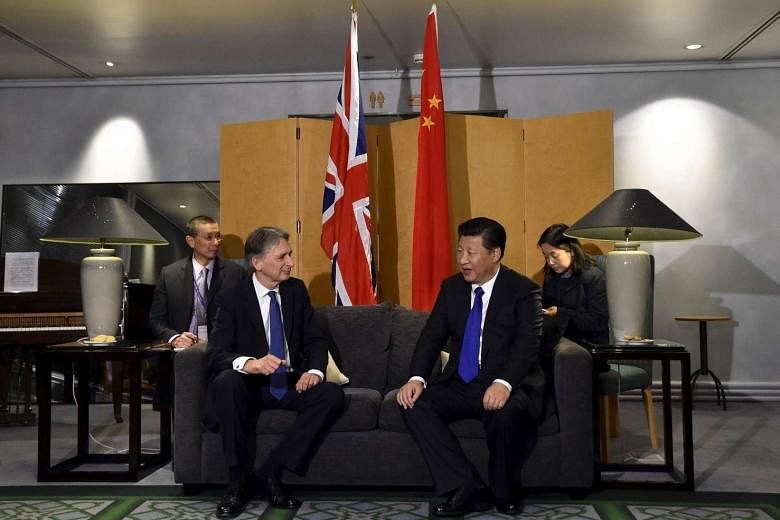LONDON (BLOOMBERG, AFP) - David Cameron said Chinese President Xi Jinping will bring more than £30 billion (S$64.4 billion) in deals and investment on his visit to Britain this week, as the British prime minister defended himself against charges that he was being too warm towards his visitor.
The deals will create 3,900 jobs in sectors including the creative industries, retail, energy, health and technology, financial services, aerospace and education, Cameron's office said in an emailed statement, without giving further details.
"Trade and investment between our two nations is growing and our people-to-people links are strong," Cameron said.
"This visit will be an opportunity to review all of these things but also talk about how the UK and China can work together on global issues such as climate change and tackling poverty. It's a real opportunity to deepen our relationship."
One major deal under discussion is for China to take a key role in a £24.5-billion project to build Britain's first new nuclear power station in decades, Hinkley Point C in south-west England.
French utility EDF has reached an agreement with Beijing's China General Nuclear Corporation and China National Nuclear Corporation to take a 33.5-per-cent stake in the project, French daily Les Echos reported.
The agreement includes the possibility of a Chinese "Hualong" reactor in Bradwell, the site of a partially-decommissioned nuclear plant owned by EDF north-east of London.
The British and Chinese leaders are due to visit the north-western English city of Manchester where more deals are expected to bolster the government's "Northern Powerhouse" project, a bid to balance Britain's London-led economy.
Xi's trip follows a five-day visit by British Finance Minister George Osborne to China in September during which he opened bidding for contracts to build a high-speed rail link that will link London with northern cities.
Britain is striking an accommodative tone after Cameron's May 2012 meeting with the Dalai Lama plunged the two countries into a two-year diplomatic freeze. China views the exiled Tibetan religious leader as a separatist and a symbol of Western efforts to weaken the country. A Chinese foreign ministry spokesman at the time chastised London for "making mistakes again and again."
"David Cameron paid a very high price in Sino-British relations and it is highly unlikely that the UK will ever be vocal over these issues again," said Andres Rodriguez, a China historian at the University of Sydney.
"Only an American president, a respectable foe in the eyes of the Chinese, can really afford to meet with the Dalai Lama and get away with it."
Sensitivity to China's politics may explain Cameron's reluctance to take sides during the pro-democracy protests in Britain's former colony of Hong Kong last year. One of his few forays into Hong Kong's politics was to lodge a protest when a group of British politicians was prevented from visiting about two weeks before the protests fizzled out.

